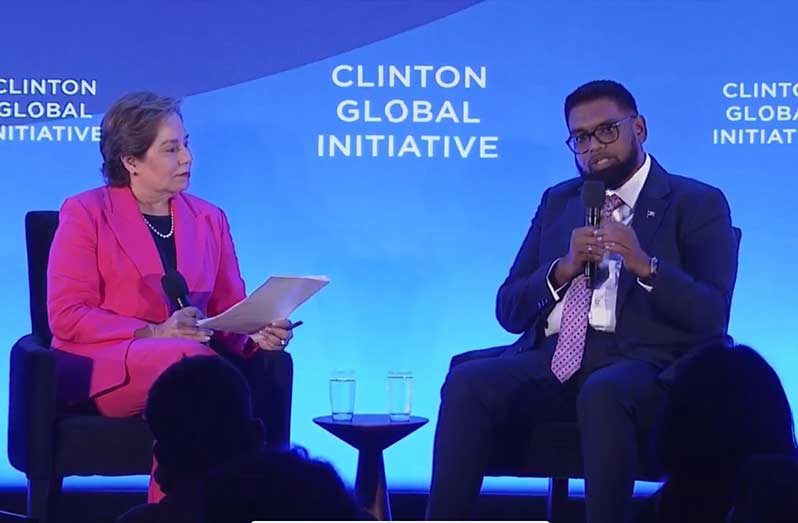–President Ali says, reiterates Guyana’s commitment to protect forest, biodiversity
EVEN as Guyana pushes for the advancement of its petroleum industry, the country’s commitment to conserving its forests and biodiversity will remain paramount, President Dr. Irfaan Ali has said.
The Guyanese Head of State made those comments while participating in the Clinton Global Initiative held in New York on Friday.
Dr. Ali, while responding to questions on Guyana’s Low-Carbon Development Strategy (LCDS), said that the country intends to accelerate its commitment to the forest and biodiversity.
“We are not changing our development path. We’re not changing our commitment on the forest; we’re not changing our commitment on biodiversity. [As] a matter of fact, we have accelerated that commitment by saying, in 18 months, we [will] double the preservation area for biodiversity,” the President said.
President Ali highlighted the significant carbon storage capacity of Guyana’s forest, which sequesters 153 million tons of carbon annually.
He pointed out, too, that even with 10 Floating Production Storage and Offloading (FPSO) vessels operating offshore, the forest would not be utilising a significant portion of its carbon sequestration capacity.
Dr. Ali said: “You have a country that is keeping its forest [at] the lowest deforestation rate in the world, committed to keeping this for the planet, safeguarding our biodiversity, expanding the mechanism.”
On Wednesday, while addressing the 79th Session of the General Assembly of the United Nations in New York, the Head of State announced the launch of a Global Biodiversity Alliance.
Guyana, in 2025, will convene the first global biodiversity alliance summit.
This platform will focus on creating a market for biodiversity credits, scaling biodiversity conservation debt swaps, accelerating biodiversity bonds, establishing a blueprint for biodiversity taxonomies, and promoting nature positive action.
This, he said, is not just a commitment of mere words: “Guyana is also committing to doubling its protected areas by December 2025 and achieving the global biodiversity target of 30% by 2030… These are real solutions that Guyana is putting forward to address the global problem of biodiversity loss. We do not lecture; we lead by example without arrogance.”
Dr. Ali had said that the initiative will be driven by the successes of the country’s LCDS.
President Ali had engaged regional stakeholders at the 2024 Concordia Amazonas Summit held in Guyana back in July.
Dr. Ali then conducted comprehensive discussions, emphasising the necessity of a collaborative approach to preserve the flora and fauna of the region.
In 2009, Guyana became the first developing nation to introduce the Low Carbon Development Strategy (LCDS). The strategy delineated a vision for the promotion of fair and sustainable development, while simultaneously safeguarding the nation’s forests, which constitute approximately 85 per cent of its total land area.
By means of its LCDS, Guyana has established a framework to achieve a harmonious integration of economic development and the preservation of the nation’s forests and biodiversity, while also receiving compensation for these efforts.
“We have committed, with Concordia, to work on bringing together the stakeholders, the leaders of these 17 countries, members of the academic community so that we can work together on building this model, to develop a pricing mechanism,” Dr. Ali said in July.



.jpg)









